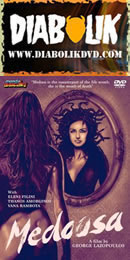
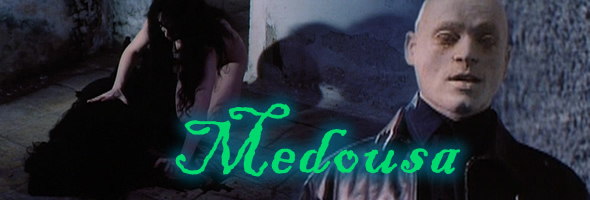
Color, 1998, 87m.
Directed by George Lazopoulos
Starring Thanos Amorginos, Vana Rambota, Eleni Filini
Mondo Macabro (DVD) (US R0 NTSC) / WS (1.66:1) (16:9)
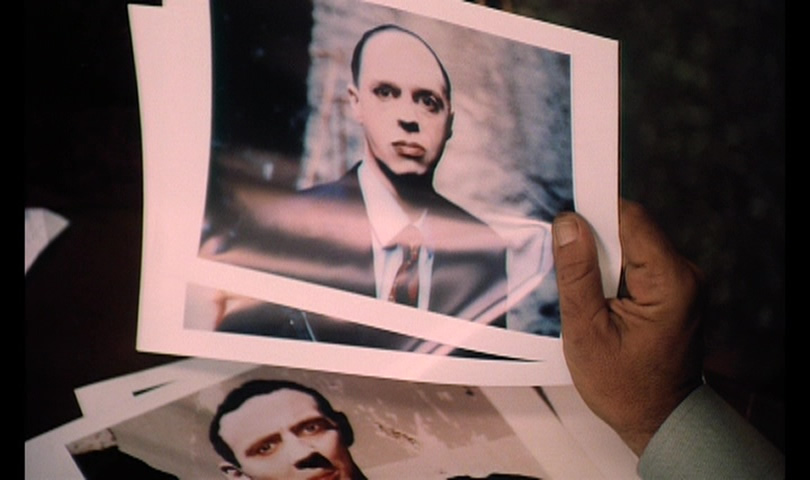
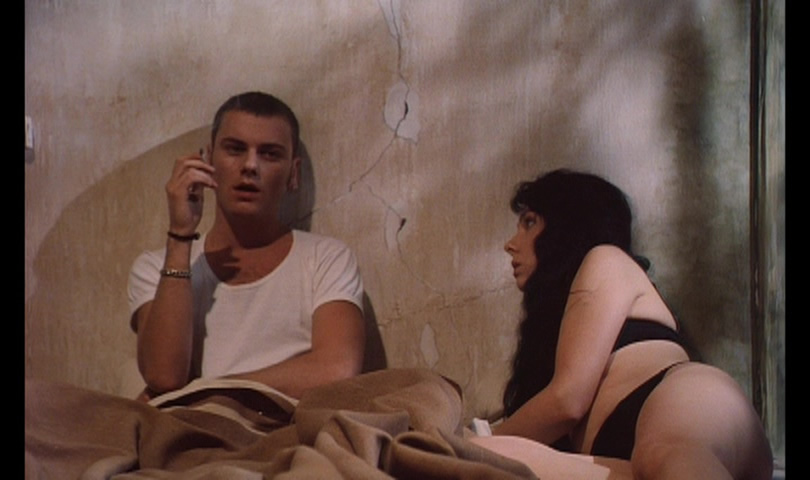 In its ongoing quest to excavate unique genre cinema around the world, Mondo Macabro plunges for the first time into the tiny pool of 1990s Greek fantastic cinema to shine a spotlight on Medousa, a seldom-seen twist on the famous myth about a woman whose face was so monstrous she could turn any man to stone. You won't get any snakes or gory beheadings here, but there are plenty of other surreal ingredients to hold your attention.
In its ongoing quest to excavate unique genre cinema around the world, Mondo Macabro plunges for the first time into the tiny pool of 1990s Greek fantastic cinema to shine a spotlight on Medousa, a seldom-seen twist on the famous myth about a woman whose face was so monstrous she could turn any man to stone. You won't get any snakes or gory beheadings here, but there are plenty of other surreal ingredients to hold your attention.
In a puzzling prologue, a young boy named Percy with an aversion to blood and a strange fascination with knives is temporarily living in Athens with his beautiful and very weird mother. She's prone to entertaining a strange crew of characters at night, which gives the lad time to sneak across the street to burlesque magic shows with knife throwers. One night she brings over a strange man and an even stranger woman (whose face is never seen), a final night in Athens whose full meaning only becomes clearer later. Back in the country Percy meets up with a little girl hauling around a Polaroid camera and shows off for her by slaughtering a chicken (off screen) with a butcher knife.
Flash forward a decade later, and Percy (Amorginos) is now the tough owner of a leather biker bar and enjoys flinging 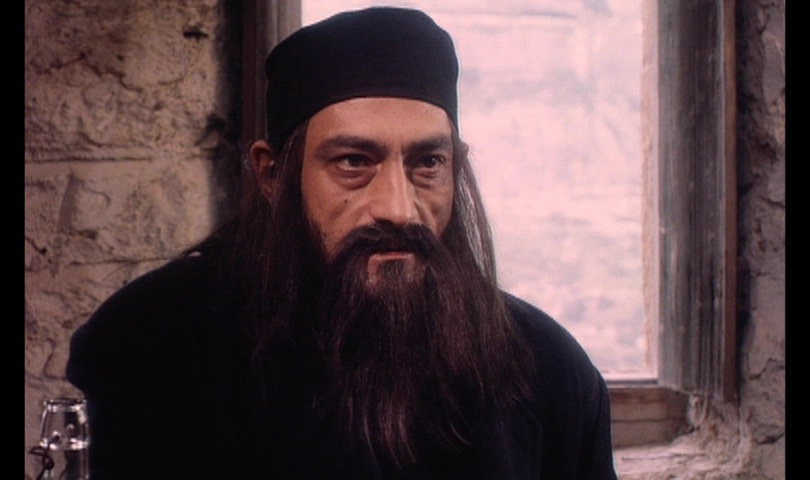 knives into painting reproductions on his wall. He's also friends with a real estate agent named Spiros (Felini)
knives into painting reproductions on his wall. He's also friends with a real estate agent named Spiros (Felini) 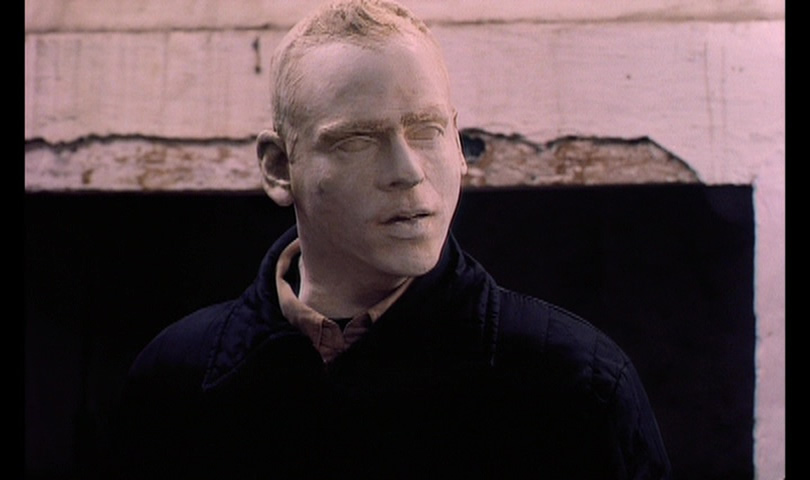 who's visited one afternoon by the strange Ms. Meda, a raven-haired pale beauty in sunglasses who wants to buy a house she'd recently leased. Spiros, Percy, and two of their cohorts, bar bouncer Mitsos and Percy's girlfriend, Katia (Rambota), are also occasional criminals who raid big empty houses for fun, and they decide to make Meda's future property their new target. Meanwhile various men affiliated with a local heroin ring are showing up turned into statues, which has the Athenian police force turned upside down. Upon arriving at Meda's house the gang uncovers a stash of stolen money, several eerie statues, and a a pair of creepy face masks, all of which point to a sinister truth tied to Percy's past and his real full name.
who's visited one afternoon by the strange Ms. Meda, a raven-haired pale beauty in sunglasses who wants to buy a house she'd recently leased. Spiros, Percy, and two of their cohorts, bar bouncer Mitsos and Percy's girlfriend, Katia (Rambota), are also occasional criminals who raid big empty houses for fun, and they decide to make Meda's future property their new target. Meanwhile various men affiliated with a local heroin ring are showing up turned into statues, which has the Athenian police force turned upside down. Upon arriving at Meda's house the gang uncovers a stash of stolen money, several eerie statues, and a a pair of creepy face masks, all of which point to a sinister truth tied to Percy's past and his real full name.
Equally reminiscent of Santa Sangre and Malpertuis though made with a tiny fraction of the budget or style, this is an odd one to be sure. It's more of a crime fantasy than a horror film despite the mostly subdued supernatural elements, but it's such a weird mix you'll stick with it just to find out where the whole thing is heading. This was the only feature film directed by George Lazopoulos, who throws a lot of ideas in here about mythology and the cultural representations of men and women; this  pays off in the last 20 minutes when the various
pays off in the last 20 minutes when the various 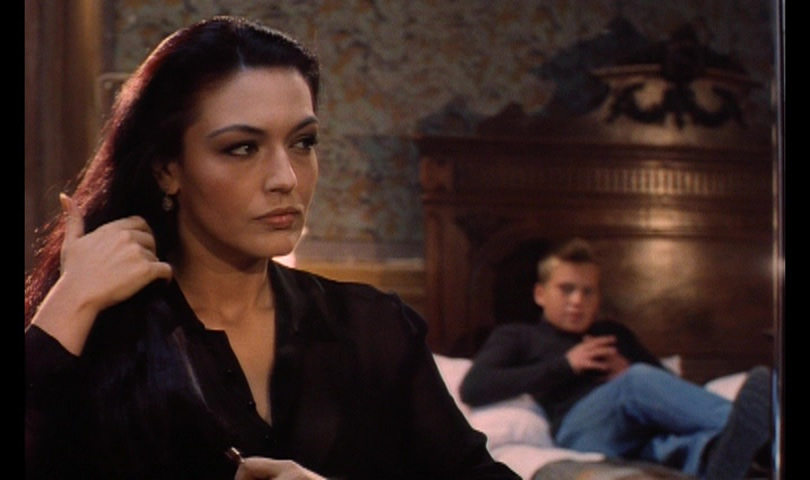 strands of the story finally coalesce for an interesting and oddly haunting resolution. Even the seemingly padded material with the cops turns out to play a key role in the ending, and you'll find it's worth sticking through some of the more amateurish acting (which is obvious even if you don't speak Greek) and an iffy music score that dips a little too often into pseudo-grunge guitar messiness.
strands of the story finally coalesce for an interesting and oddly haunting resolution. Even the seemingly padded material with the cops turns out to play a key role in the ending, and you'll find it's worth sticking through some of the more amateurish acting (which is obvious even if you don't speak Greek) and an iffy music score that dips a little too often into pseudo-grunge guitar messiness.
Shown at film festivals and given a tiny theatrical release, Medousa never received an English-subtitled video release until the 2016 DVD from Mondo Macabro. The anamorphic 1.66:1 transfer appears to be an older one struck for a digital release several years ago based on the quality, but it's not bad for what it is apart from a color scheme that looks more beige and dreary than it possibly should. The Greek stereo audio is standard Dolby Digital with optional English subtitles (which amusingly confuse "heroin" with "heroine"). Along with a very brief trailer (less than a minute) you get two featurettes, the more substantial being the 34-minute "Looks Can Kill" with Lazopoulos speaking in heavily accented English about his filmic inspirations (Sergio Leone and Akira Kurosawa), studying film in London, spending four years mounting this film, pulling influences from Greek mythology and peplum films, and his life since the production of Medousa. The 10-minute "Meeting George" catches up with Amorginos, a rock singer who was singled out for this role at a club despite his lack of acting experience. He's candid about how he felt he improved and gained confidence over the course of the production and seems proud of both the experience and the final result.
Reviewed on April 10, 2016.




 In its ongoing quest to excavate unique genre cinema around the world, Mondo Macabro plunges for the first time into the tiny pool of 1990s Greek fantastic cinema to shine a spotlight on Medousa, a seldom-seen twist on the famous myth about a woman whose face was so monstrous she could turn any man to stone. You won't get any snakes or gory beheadings here, but there are plenty of other surreal ingredients to hold your attention.
In its ongoing quest to excavate unique genre cinema around the world, Mondo Macabro plunges for the first time into the tiny pool of 1990s Greek fantastic cinema to shine a spotlight on Medousa, a seldom-seen twist on the famous myth about a woman whose face was so monstrous she could turn any man to stone. You won't get any snakes or gory beheadings here, but there are plenty of other surreal ingredients to hold your attention. knives into painting reproductions on his wall. He's also friends with a real estate agent named Spiros (Felini)
knives into painting reproductions on his wall. He's also friends with a real estate agent named Spiros (Felini)  who's visited one afternoon by the strange Ms. Meda, a raven-haired pale beauty in sunglasses who wants to buy a house she'd recently leased. Spiros, Percy, and two of their cohorts, bar bouncer Mitsos and Percy's girlfriend, Katia (Rambota), are also occasional criminals who raid big empty houses for fun, and they decide to make Meda's future property their new target. Meanwhile various men affiliated with a local heroin ring are showing up turned into statues, which has the Athenian police force turned upside down. Upon arriving at Meda's house the gang uncovers a stash of stolen money, several eerie statues, and a a pair of creepy face masks, all of which point to a sinister truth tied to Percy's past and his real full name.
who's visited one afternoon by the strange Ms. Meda, a raven-haired pale beauty in sunglasses who wants to buy a house she'd recently leased. Spiros, Percy, and two of their cohorts, bar bouncer Mitsos and Percy's girlfriend, Katia (Rambota), are also occasional criminals who raid big empty houses for fun, and they decide to make Meda's future property their new target. Meanwhile various men affiliated with a local heroin ring are showing up turned into statues, which has the Athenian police force turned upside down. Upon arriving at Meda's house the gang uncovers a stash of stolen money, several eerie statues, and a a pair of creepy face masks, all of which point to a sinister truth tied to Percy's past and his real full name. pays off in the last 20 minutes when the various
pays off in the last 20 minutes when the various  strands of the story finally coalesce for an interesting and oddly haunting resolution. Even the seemingly padded material with the cops turns out to play a key role in the ending, and you'll find it's worth sticking through some of the more amateurish acting (which is obvious even if you don't speak Greek) and an iffy music score that dips a little too often into pseudo-grunge guitar messiness.
strands of the story finally coalesce for an interesting and oddly haunting resolution. Even the seemingly padded material with the cops turns out to play a key role in the ending, and you'll find it's worth sticking through some of the more amateurish acting (which is obvious even if you don't speak Greek) and an iffy music score that dips a little too often into pseudo-grunge guitar messiness.